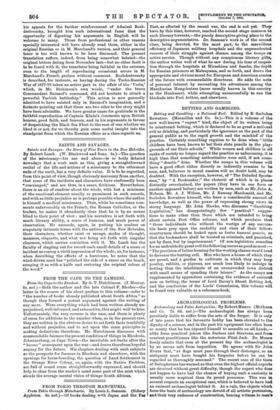TRADE UNIONS.
Trade Unions. By Geoffrey Drage. (Methuen and Co. 28. 6d.) --The author of this volume has frequently shown his capacity for dealing with its subject fairly. Perhaps he takes the general ignorance of the public in regard to it too much for granted. "Many educated people would be surprised to learn that during the eleven years 1892-1902 100 principal trade- unions. spent 61 per cent, of their total income—that is R10,800,000 out of .616,900,000—on the various friendly benefits
to their members, while even more would receive with in- credulity the assertion that only 19 per cent, of the same total was expended on labour disputes." It strikes us that most really "educated people" have sufficient knowledge of the history of the Trade-Union movement to be acquainted with this elementary fact. Happily, however, Mr. Drage has far more important things than this to say—for example, of the significance of the Taff Vale decision—and as he is well known to be by no means favourable to the more extravagant claims of Trade-Unions, his statements and opinions alike should, on account of their deliberate modera- tion, commend themselves to those " politicians " whom he is especially anxious to reach. In the four chapters which, with a general conclusion and historical and legal appendices, constitute this volume of less than two hundred pages Mr. Drage deals with the history, finances, influence, and organisation of Trade-Unions, and devotes a considerable amount of space to a description of the work of the annual Congress. The moderation which we have alluded to as the note of Mr. Drage's book is evidenced by such an almost too cautious prophecy as this :—" It appears very probable that there will be a great increase in the Labour vote at the next General Election, and there will be a gradual leaven- ing, not only of Parliament, but also of all future Liberal Administrations, with an ever-increasing number of Labour Members." Mr. Drage also admits that "trade-unionism has edu- cated an immense number of men in self-reliance and self-sari. flee, in business capacity and provident habits ; it has improved the physique and the mental and moral character of its adherents, and in this way it has placed at the command of British employers a labour force unequalled in the world." Finally, speaking of "the contempt for foreign competition" evidenced by working men, he says :—"The remedy is to be sought, I believe, not in any abandonment of the principles of trade-unionism, nor even in an abatement of its claims, but rather in better education, in the spread of more enlightenment, and in a higher ideal of the duties of citizenship."
MUSEUMS.
Museums: their History and their Use. By David Murray, LL.D. 3 vols. (J. MacLehose and Sons, Glasgow. 32s. net.)—Not a few readers can match Dr. Murray's experience when he tells us that "he has cut the leaves of a score of volumes which have stood unopened on the shelves of various libraries, some for two, some for three hundred years"; but few have opened these unused volumes to such good purpose as Dr. Murray. He has given us a most interesting book, one which takes us back to a state of things which we have long outgrown. Some of our readers will remember Montagu House (the old British Museum), with the stuffed giraffes on its stately staircase ; more will remember the old Ashruolean at Oxford,—Oxford naturally kept to the old order after it had been discarded elsewhere. These are the " Museums " to which Dr. Murray takes us. The subject is one that cannot easily be exhausted, for, indeed, the " curiosities " which are part of it are beyond numbering. There is the "unicorn horn," for instance, without which, we are told, "no museum of any repute was considered com- plete." It was one of the most precious rarities in the world. I moneylender would make advances on the security of it; public treasuries bought specimens for huge sums of money. Then there was the "Barnacle goose," a precious animal because it could be eaten in Lent, the theologians having decided that it was more a fish than a fowl. It is instructive to read how these curiosities were arranged. Dr. Murray quotes from the " Encyclopaedia Perthensis," a great authority in its day, and that day not a hundred years ago. "The tops of the presses," we read, "are commonly ornamented with shells of a very great size, foreign wasps, hives, the horn of a rhinoceros, an elephant's trunk, the horn of a unicorn [surviving, it will be seen, down to quite recent times], urns and busts of alabaster, jasper, marble, porphyry, or serpentine stone." Here is a passage from a still more recent pamphlet on the Ashmolean :—" The first division proposes to familiarise the eye to those relations of all natural objects which form the basis of argument in Dr. Paley's 'Natural Theology." The purpose was admirable, but we have learnt, it is to be hoped, a more excellent way. Dr. Murray goes on to give some practical directions for making collections as useful and instructive as possible. And he has supplemented his book with very complete and laboriously constructed lists and indexes.
THE RUSSIAN NAVY IN THE RUSSO-JAPANESE WAR.
The Russian Navy in the Russo-Japanese War. By Captain N. Klado. Translated from the French of Rene Marchand by T. J. H. Dickinson.. (Hurst and Blackett. 58.)—Captain Klado's candid comments on Russian naval administration, in the course of
his appeals for the farther reinforcement of Admiral Rozh- destvensky, brought him such international fame that the opportunity of digesting his arguments in Engliih will be welcome to many. Those from professional or other reasons specially interested will have already read them, either in the original Russian or in M. Marchand's version, and their general tenor is too well known to be here discussed. The present translation suffers, indeed, from being somewhat belated—the original letters dating from November last—but no other fault is to be found with it, the translator being faithful in the extreme, even to the length of reproducing occasional errors in M. Marchand's French preface without comment. Rozhdestvensky is described, for instance, as having during the Turko-Russian War of 181748 taken an active part in the affair of the Vesta,' which, in Mr. Dickinson's own words, "under the brave Commandant Baranors command, did not hesitate to attack a powerful Turkish battleship." This action is now generally admitted to have existed only in Baranors imagination, and a footnote pointing out that there are two sides to the story might have been advisable. We have greater cause for gratitude in the faithful reproduction of Captain Illado's comments upon British honour, good faith, and bravery, and in his arguments in favour of despatching the Black Sea Fleet to the seat of war whether we liked it or not, for we thereby gain some useful insight into the standpoint from which the Russian officer as a class regards us.
SAINTS AND SAVAGES.
Saints and Savages: the Story of Five Years in the New Hebrides. By Robert Lamb. (W. Blackwood and Sons. es.)—The question of the missionary—his use and abuse—is so hotly debated nowadays that a work such as this, giving a straightforward recital of the life and actions of a missionary to the uttermost ends of the earth, has a very definite value. It is to be regretted, from this point of view, though obviously necessary from another, that some of the incidents and characters have confessedly been *rearranged," and are thus, in a sense, fictitious. Nevertheless, there is an air of candour about the whole, with but a minimum of the emotional element usually so prominent in such records, and with as little prejudice as is perhaps possible where the author is himself a medical missionary. Thus, while he sometimes com- ments unfavourably on the French, the Roman Catholics, or the traders, he makes it abundantly clear that he is by no means blind to their point of view ; and his narrative is set forth with much literary ability, a sense of humour, and much power of observation. He succeeds, again, in putting his readers on singularly intimate terms with the natives of the New Hebrides, their characters, whether saint or savage, modes of thought, manners, etiquette, and what not being set forth with singular clearness, which carries conviction with it. Mr. Lamb has the faculty of singling out for record such small details of a scene or incident as convey a vivid impression of the whole; as, for instance, when describing the effects of a hurricane, ho notes that the wind-driven sand has "polished the side of a canoe on the beach, scraping it as with a knife and restoring the original colour of the wood."
FROM THE CAPE TO THE ZAMBESI.
From the Cape to the Zambesi. By G. T. Hutchinson. (J. Murray. 9s. net.)—Both the author and the late Colonel F. Rhodes—the latter in the course of his short preface to this volume—refer to "the number of books already published about South Africa" as though they formed a potent argument against the writing of any more. Were everything which had been written already un- prejudiced, well-informed, and exhaustive, this might well be true. Unfortunately, the very reverse is the case, and there is plenty of room for additions to the number when, as in the present case, they are written in the obvious desire to set forth facts truthfully and without prejudice, and to act upon the same principles in making deductions therefrom. Mr. Hutchinson discusses with commendable fairness the present condition of things in Rhodesia, Johannesburg, or Cape Town—the inevitable set-backs after the " booms " consequent upon the war—and draws therefrom hopeful augury for the future. His chapters dealing with such subjects as the prospects for farmers in Rhodesia and elsewhere, with the openings for horse-breeding, the question of Land Settlement in the Orange River Colony, or, again, with the Native Problem, are full of sound sense straightforwardly expressed, and should help to clear from the reader's mind some part of the mist which clouds the average mental vision of things South African.



























































 Previous page
Previous page